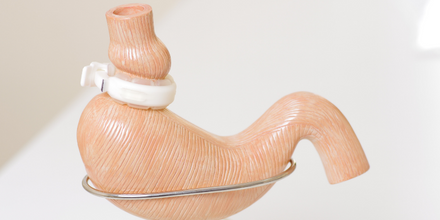Every year, thousands of people undergo bariatric surgery as a treatment option for obesity. These surgical procedures lead to long-term weight-loss and great improvements in health. Bariatric surgery may be an option to consider for people who have a Body Mass Index (BMI) of 40 or greater, or 35 and greater with significant health co-morbidities.
The decision to have bariatric surgery can be a significant step toward improved health and wellness. However, it’s not an easy road. Behavior change is essential both before and after surgery, and the long-term changes must continue for the rest of your life. The combination of bariatric surgery, good nutrition and behavior change can lead to fantastic results.
Basics of Bariatric Diets
- Decreased Portions. A small stomach pouch (about the size of an egg) is created during surgery. Because of this, eating small portions is required. Although food intake increases over time, portion sizes remain small. Because of this, every bite is important! Post-bariatric patients need high-quality food choices because there is no room for extra. Protein, vegetables, fruit and minimal grains are the basics of most bariatric plans.
- Focus on Protein. Protein is important to maintain muscle mass, among so many other things. Generally, bariatric plans recommend 60-80 grams daily. Protein-based meals and protein supplements between meals are required. The good news is that there is a variety of protein supplement options.
- Essential Vitamins. Due to restriction and malabsorption from surgery, vitamins are a lifelong requirement. A bariatric multiple vitamin can help you meet your nutritional needs. Extra amounts of vitamin D, vitamin B12, Iron and Zinc are just a few examples of what is required. Additionally, 1200-1500 mg of Calcium is needed daily. Healthcare professionals can monitor labs while patients choose the appropriate multivitamin.
- Focus on Fluid. Hydration is important! Some people find it difficult to meet their fluid needs after surgery, but 64 ounces or more daily is ideal. Bariatric diets recommend sugar-free fluids and sometimes decaffeinated drinks. Water is always the best choice.
- Avoid Sugars and Fats. Cakes, chips and cookies should all be moderated. Many bariatric patients have difficulty tolerating these foods. Others struggle to maintain their weight when they add these foods back into their diet. Try to either avoid these foods or eat them in moderation.
- Exercise is Always Important. Long-term weight maintenance correlates with regular physical activity. It’s important to develop a regular exercise routine for general health and long-term weight management. There are so many options to choose from, such as walking, swimming and dancing. Find what works for you!
- Get Support. Support is a key element of success. Online and in-person support groups can help with connection, recipes, motivation, weight management tips and more.
- Mindset Matters. Changing your behavior can be difficult, but it’s important to embrace change. Focus on what is included in your diet instead of what isn’t allowed and celebrate every step of your journey.
When bariatric surgery is combined with nutrition, exercise and behavior change, the expected weight-loss is 60-80% of excess weight, depending on surgery type. Along with weight-loss, the health benefits of bariatric surgery can be life-changing. Resolution and improvement in health conditions such as diabetes, hypertension and Gastroesophageal Reflux Disease (GERD), just to name a few, make surgery a great option for many people.






